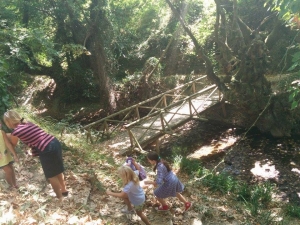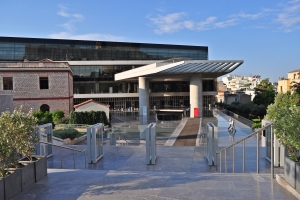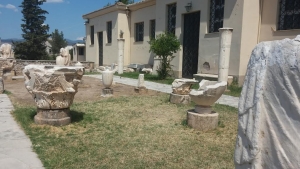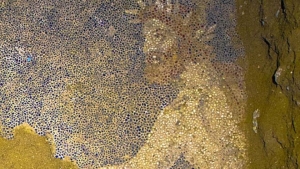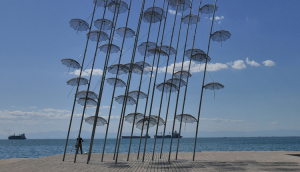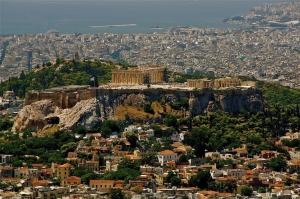LIFE & CULTURE
XpatAthens
Thursday, 25 August 2016 07:00
A Small Picnic Paradise In Varnavas
Parents are often asking where the best places are to show their children the experience of fall. Many expat parents remember those September and October autumn days in their home countries with colored leaves, chestnuts and walks in the forests. And the general idea is that this is something one can only find in Greece’s countryside, but not in Athens. Yet, there are many places in and around the city that can give you that autumn feeling. Family Goes Out shows us one of them:
On a warm Sunday morning in September, my friend Sofia invited me and the girls to drink a coffee near Kapandriti. Kapandriti is situated in the green corner of North Attika, 37 km from Syntagma square. Sofia said that she knew a ‘small paradise’, a picnic place where the children would be able to play in the forest and we would be able to watch them and relax.
When we got there, I could not agree more with my friend. This place is indeed a small paradise.
It is called Kioski and is actually just a kiosk on the side of the mountain road in between the villages of Kapandriti and Varnava. The kiosk is surrounded by oak and chestnut trees and there are picnic tables and a hammock around. Behind the kiosk is a steep staircase carved in the mountain that leads to an exciting river. The river was almost dry in this period of the year but has lots of water in the winter time. A wooden bridge leads across the river and can be the start of a beautiful hike. The kiosk serves coffee, (alcoholic) drinks, small snacks like toast, crisps and ice cream and some freshly prepared mezedes. There is a mobile bathroom near the kiosk and there is a small parking area.
The children played in the sand near our table whilst we had our coffee. Later they climbed down to the river and played around the water. The water was only a few centimeters high and because all of our children can swim, I did not worry. A romantic wooden bridge took them to the other side of the river and they had fun throwing stones in the water. Later on, they relaxed in the Kioski hammock, climbed in trees and collected stones and leaves. We ordered lunch and the children had ice cream. We had a lovely morning.
To read more, please visit: Family Goes Out
Published in
Kids Life
Tagged under
Wednesday, 14 October 2015 11:10
Christopher Columbus - A Woolworker From Genoa Or Byzantine Prince From Chios?
There has been more written about Christopher Columbus than about any person with the exception of Jesus Christ, and yet his past has been shrouded in mystery. We all have been told that he came from Genoa, a city in Italy and sailed for Isabella and Ferdinand, the king and queen of Spain, after many years of trying to convince them that the world was round, a belief that was uncommon despite the fact that Aristotle had said it over a thousand years before.
Most of what we know about Columbus is conjecture and much of his history was written by people who never knew him or had reasons of their own for rewriting or presenting as truth something that was just a theory. The story of his being the son of a woolworker from Genoa for example only came from the fact that there was someone named Columbus from Genoa who was a wool worker and is a legend attributed to Peter Martyr de Anghiera. Go to Genoa and you will see that there are monuments and a show of pride in it being the birthplace of Columbus.
Most of what we know about Columbus is conjecture and much of his history was written by people who never knew him or had reasons of their own for rewriting or presenting as truth something that was just a theory. The story of his being the son of a woolworker from Genoa for example only came from the fact that there was someone named Columbus from Genoa who was a wool worker and is a legend attributed to Peter Martyr de Anghiera. Go to Genoa and you will see that there are monuments and a show of pride in it being the birthplace of Columbus.
There is a book called, 'A New Theory Clarifying The Identity Of Christoper Columbus: A Byzantine Prince From Chios, Greece' written by Ruth G Durlacher-Wolper, the founder and the director of the New World Museum and the New World Foundation in San Salvador, Bahamas, where Columbus' ships first landed in 1492.
The book is carefully researched and after reading it even if you are not convinced you will certainly be less sure that all you knew before was the truth. For those of you who remember your Byzantine history, you may recall that the Paleologos Dynasty were the Byzantine Emperors who traced their descendants to the Royal House of David and fled to the west after the fall of Constantinople. According to the book, Columbus and his kinsman Colon-the-Younger came to France with the Paleologi and mixed with the royalty of the period, which would make sense. Why would the King and Queen of Spain give him three ships and a lot of money if he was the son of a Genovese woolworker?
Columbus never said he was from Genoa. He said he was from the Republic of Genoa, something much different. The island of Chios was part of the Republic of Genoa. The name Columbus is carved above many doors in the villages of Pirgi and Cimbori and a priest with that last name traces his ancestry on the island back over 600 years. There are also many Genovese families who trace their ancestry back to Chios. Columbus also wrote about the gum-mastic called mastika which comes only from Chios.
The book presents many convincing arguments and in the end summarizes them with 22 facts contributing to the clarification of Columbus' identity. Among the most interesting are:
Columbus' signature "Xro-Ferens" Christophoros is Greek-Latin or Byzantine.
Columbus spelled Chios with a Greek 'X'.
Columbus named Cape Maysi in Cuba using Greek words, Alpha and Omega.
The Colombo family of Genoa were illiterate and the Genovese Christophoro was a woolweaver. For this person to acquire the learning, experience and spirituality that Columbus had that could convince a foreign king and queen to entrust a small navy and a fortune to him doesn't seem probable. Maybe in twentieth century America a poor son of a common garment worker can grow up to become president but in the Europe of the 15th century it is unlikely he could make Captain, much less Admiral in command of a fleet. It is more likely that for Columbus to have received an audience with a king and queen he would have to be royal himself or have some pretty good connections.
Columbus' son Ferdinand wrote that his ancestors have always followed the sea. Unless the Columbo family of Genoa had a long history of being ships tailors or official shearers of sea-sheep then they were not related. In fact even though they were living in Genoa at the time that Ferdinand was writing about his father, they are not mentioned. Nor are they mentioned in the Will of Columbus.
For more on this interesting topic, please visit: GreeceTravel
We've had a difficult time turning up a copy of the book online, but have found a link on Amazon UK. You may also contact the publisher: John Perikos - Kallimassia - Chios 8210 - Greece.
Columbus' signature "Xro-Ferens" Christophoros is Greek-Latin or Byzantine.
Columbus spelled Chios with a Greek 'X'.
Columbus named Cape Maysi in Cuba using Greek words, Alpha and Omega.
The Colombo family of Genoa were illiterate and the Genovese Christophoro was a woolweaver. For this person to acquire the learning, experience and spirituality that Columbus had that could convince a foreign king and queen to entrust a small navy and a fortune to him doesn't seem probable. Maybe in twentieth century America a poor son of a common garment worker can grow up to become president but in the Europe of the 15th century it is unlikely he could make Captain, much less Admiral in command of a fleet. It is more likely that for Columbus to have received an audience with a king and queen he would have to be royal himself or have some pretty good connections.
Columbus' son Ferdinand wrote that his ancestors have always followed the sea. Unless the Columbo family of Genoa had a long history of being ships tailors or official shearers of sea-sheep then they were not related. In fact even though they were living in Genoa at the time that Ferdinand was writing about his father, they are not mentioned. Nor are they mentioned in the Will of Columbus.
For more on this interesting topic, please visit: GreeceTravel
We've had a difficult time turning up a copy of the book online, but have found a link on Amazon UK. You may also contact the publisher: John Perikos - Kallimassia - Chios 8210 - Greece.
Published in
People
Tagged under
Wednesday, 14 October 2015 07:00
Acropolis Museum Among The Best In The World
TripAdvisor, one of the largest travel sites, has announced its Travellers’ Choice™ awards for museums around the world in September 2015.
Award winners were determined using an algorithm that took into account the quantity and quality of reviews for museums around the world, gathered over a 12-month period. The Acropolis Museum in Athens, Greece is among the best museums ranked 11th in the world and 8th in Europe attracting hundreds of tourists every year and receiving great reviews.
To read more, please visit: Parthenon UK
For a complete list of the top 25, visit Trip Advisor
Published in
Local News
Tagged under
Tuesday, 13 October 2015 07:00
Elefsina And The Goddess Dimitra
Every person arriving in Athens Airport, probably recognizes the place name “Elefsina”! From the moment you leave the airport by car, bus or taxi, you see that all directions on the highway point to “Elefsina”! A very known name for every Greek, but not that known for tourists. So especially for you, here is the story of Elefsina.
Elefsina is located only 20 kilometers away from Athens. It is certainly a place you would have heard of had you lived in ancient times. People all the way from Asia and Eastern Africa made the pilgrimage to participate in the Great Mysteries of the Goddesses Demeter and Persephone.
In the antiquity Elefsina, together with Athens, Olympia, Delphi and Delos formed the 5 sacred cities. In ancient times, and for 2000 years, Elefsina was connected with the cult of the goddess Demeter and her daughter Persephone. There was the festival of the Elefsinian mysteries, which were celebrations in honor of the goddess Demeter and her daughter, who was the goddess of spring and Queen of the Underworld.
The goddess Demeter (Dimitra) was one of the twelve gods who lived on Mount Olympus. She was the goddess of earth and agriculture. It was Demeter who taught the people how to cultivate the land. Demeter was the daughter of Cronus and Rhea and sister of Zeus. With Zeus she had a daughter, Persephone.
When Pluto, god of the Underworld, snatched Persephone, Demeter wandered the earth searching for her daughter, until she found her in Elefsina. There the king of Eleusis (Elefsina), Keleus, hosted her and in return she established the Elefsinian Mysteries, the most important festival of antiquity.
Even today, we know little about the ceremonies and events during their celebration. At the end of the 4th century AD the Festival declines, the sanctuary turned into ruins and the cult was abandoned.
Years of religious conflict, war, and looting foreigners destroyed the area of its greatness, and now it’s a strange mystical place situated just above an industrial shipyard. However, on the archaeological site of Elefsina, we can travel mentally to the time when the Mysteries had taken nationwide character. It is a place worth visiting, with a great archaeological museum, that no one ever sees.
This article has been provide by Omilo Language and Culture in Greece.
To learn more about them, please click HERE.
Click HERE to see some of their current courses.
Published in
Travel Greece
Tagged under
Thursday, 15 October 2015 07:00
Greek Tomb Was For Alexander The Great's Friend Hephaestion
The archaeologist investigating an ancient Greek tomb from the era of Alexander the Great has suggested it was a funeral shrine for his closest friend Hephaestion.
Greeks have been enthralled for months by the mystery surrounding the Amphipolis monument. Now, Katerina Peristeri has revealed that fragmentary inscriptions link the tomb to Hephaestion.
Hephaestion died less than a year before the Macedonian leader. After his death in 325BC, Alexander was said to have ordered that shrines be constructed throughout the empire.
Monogram
Ms Peristeri's team believe the site at Amphipolis may have been designed by one of two architects, Dinocrates or Stesicrates, and built by Antigonus, another of Alexander's generals.
They also believe that tiny inscriptions found at the site show Hephaestion's monogram (two initials from his name).
However, not everyone was convinced by the team's revelations.
Prof Panayiotis Faklaris of Aristotle University of Thessaloniki told Greek radio on Thursday that there was no indication that the tomb had any connection to Hephaestion or that Alexander had ordered it to be constructed.
There had earlier been speculation that the tomb may be linked to Alexander the Great's mother Olympias or his wife Roxana.
And earlier this year, bones were recovered at the site that belonged to at least five individuals including an elderly woman, a newborn child and two men, one of whom had been stabbed.
To read more, please visit: The BBC
Published in
Greece In The News
Tagged under
Tuesday, 23 April 2019 00:00
Thessaloniki - A Great Mini Break Destination
Warm and generous, Thessaloniki is at the same time historic and avant-garde: the second largest city in Greece, ideal for a city break, a mosaic of cultures and fascinating holiday moments.
Located in Macedonia, Northern Greece, there is a city unlike anywhere else in Greece. Thessaloniki is a sprawling urban centre, a cultural melting pot, where dreams, ideas, visions and trends percolate in an alternative, avant garde scene. Its history is written upon everything you see: the Thermaic Gulf, the White Tower, Nikis Avenue, Aristotelous Square, Mitropoleos Avenue, Tsimiski Avenue, Ladadika, Modiano Market, Bit Bazaar and the Old City.
For thousands of years, this northern port-town has been a meeting point for people of different cultures. Impressive attractions, cafes, bars, traditional tavernas, gourmet restaurants, a lively nightlife – you’ll find everything here in Thessaloniki, the beautiful ‘bride of the Thermaic Gulf’.
Thessaloniki: A Multicultural Centre
Trace the civilizations and peoples that have left their mark on this great city of Thessaloniki. The Palace, the Triumphal Arch and the impressive Rotunda offer an insight into to the reign of emperor Galerius Maximilianos (early 4th century) and formed the city’s administrative and religious centre in Roman times. Or the Jewish Museum, in an elegant listed building of 1904 on Agiou Mina Street, recreating the life of the Jewish community in pre-War Salonica and its subsequent extermination by the Nazis. Finally, don’t forget to visit the former home of Kemal Ataturk, founder of modern Turkey.
Or wander the narrow lanes of Ano Poli, one of the oldest districts of Thessaloniki, above the modern town. There you’ll admire the numerous attractions, most of which are castles and religious monuments: the Trigoniou Tower, with its amazing view and the Eptapyrgio fortifications, Ottoman monuments, the Vlatades monastery and the Byzantine churches of Osios David and Agios Nikolaos Orfanos. This is the most unspoilt district of the old city. And let’s not forget, of course, the iconic 16th century White Tower, by Aristotelous Square in the city centre.
To learn more about Thessaloniki, please visit: Discover Greece
Published in
Travel Greece
Tagged under
Monday, 12 October 2015 07:00
Delta Announces Athens–New York Summer 2016 Flights Now On Sale
Delta Air Lines’ nonstop double daily flights between Athens and New York-JFK are now on sale for travel in summer 2016, an announcement said on Monday 5th October 2015.
Flights will begin five times weekly from March 27, 2016, increasing to a daily service from May 24, 2016 using an Airbus A330-300 aircraft with 292 seats.
From May 27, 2016, an additional flight will be added which will also operate on a daily basis with a Boeing 767-400 aircraft with 245 seats, bringing the weekly total to 14 flights.
During the peak summer months, Delta will offer over 7,500 weekly seats between Greece and the United States.
All services from Athens are operated in conjunction with joint venture partners Air France KLM and Alitalia.
“Our investment in our New York-JFK hub means we offer greater connectivity for customers travelling to the United States and beyond from Greece,” said Nat Pieper, Delta’s senior vice president for Europe, Middle East and Africa."
Flights will begin five times weekly from March 27, 2016, increasing to a daily service from May 24, 2016 using an Airbus A330-300 aircraft with 292 seats.
From May 27, 2016, an additional flight will be added which will also operate on a daily basis with a Boeing 767-400 aircraft with 245 seats, bringing the weekly total to 14 flights.
During the peak summer months, Delta will offer over 7,500 weekly seats between Greece and the United States.
All services from Athens are operated in conjunction with joint venture partners Air France KLM and Alitalia.
“Our investment in our New York-JFK hub means we offer greater connectivity for customers travelling to the United States and beyond from Greece,” said Nat Pieper, Delta’s senior vice president for Europe, Middle East and Africa."
To read more, please visit: Greek Travel Pages
Published in
Local News
Tagged under
Thursday, 15 October 2015 07:00
Athens Ranks 1st Among 25 Most Influential Cities In The World
Two Greek cities, that have always been a magnet for art and culture, were included on the list of the 25 cities with the greatest impact on the world.
More specifically, the capital of Greece, Athens, ranked in first place in the list that was compiled by List25, the website that gathers and presents lesser-known intriguing information on a variety of subjects, while at #22 one can find Olympia, in western Peloponnese.
“Birthplace of Western civilization, Athens is the most influential city ever in the fields of philosophy, architecture, politics, science, and free thinking, as well as the original home of what is considered the most ideal system of government: democracy,” the website reads while it continues, referring: “Athens also became the first city to organize the first modern Olympics back in 1896. Some of its most famous citizens include giants such as Socrates, Plato, Solon, and Pericles.”
To read more and see the full list of the 25 cities, please visit: Greek Reporter
Published in
Greece In The News
Tagged under
Monday, 12 October 2015 07:00
Wedding Dress By Greek Designer Among 15 Most Beautiful In The World
Modest wedding dresses that were once in fashion no longer are, apparently. Fashion trends now require that dresses are not only "heavier" and voluminous, decorated with luxurious lace, pearls, but also long-sleeved.
Popular wedding fashion website ''The Knot'' has presented the 15 most beautiful long-sleeved wedding dresses. Some are the works of world famous designers like Oscar de la Renta and Carolina Herrera and others of their talented but less famous colleagues.
One of them is Greek designer Christos Costarellos, who lives and works in Athens.
The dresses by Christos Costarellos are unique, with a very fresh vision that aims to emphasize the charm and character of every woman who chooses to wear one of them.
In his penultimate collection he uses vapoury tulle, silk organza and other sheer fabrics like muslin and dotted tulle. The dresses are neo-romantic in style with the addition of some discrete and elegant traditional elements. Their main feature is movement.
To see a selection, please visit: Greek Reporter
Published in
Greece In The News
Tagged under
Thursday, 08 October 2015 07:00
Top Flea Markets In Athens
In the heart of buzzing Athens there are a lot of open markets selling anything from food and spices to vintage clothing, antiques and souvenirs. Even if you don’t want to shop a walk into the flea market is a great way to get the real vibe of Athens.
Here is a list of the top flea markets in the centre of Athens:
Monastiraki Flea Market
Monastiraki flea market starts next to Monastiraki metro station. It's not an actual flea market, but a collection of small shops. Here you can buy almost anything, form clothing, jewellery, cheap souvenirs like t-shirts, toy exzone soldiers, marble Greek statues, postcards and quality souvenirs like backgammon sets, Byzantine icons, traditional Greek products, musical instruments and leather goods. In Monastiraki flea market you will find almost everything. Near the flea market there ar ea lot of cafes where you can stop for a refreshment and watch the people passing by. Early in the morning and late at night when the shops are closed, all the shop fronts are covered with street art, which is totally worth checking out.
Platia Avissinias Flea Market
Every Sunday at Avissynias Square, just off Ifaistou Street, the central street of Monastiraki flea market, there is a bazaar. There are vendors selling antiques from furniture to old books and recornds to anything you can imagine. Some have no value at all, but you can also find a lot of bargins. There are some cozy cafes at the square and Avissynias restaurant with live Greek music and traditional food where you can have a bite and watch all the action of the square.
To read more, please visit: Travel Passionate
Published in
City Discovery
Tagged under

